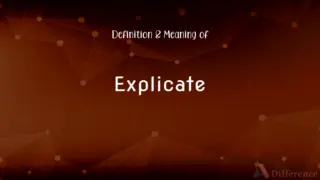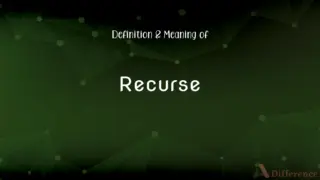Omit Definition and Meaning
By Tayyaba Rehman & Fiza Rafique — Updated on March 5, 2024
Omit means to leave out or exclude something, either intentionally or by oversight. e.g., He realized too late that he had omitted a crucial step in the recipe.
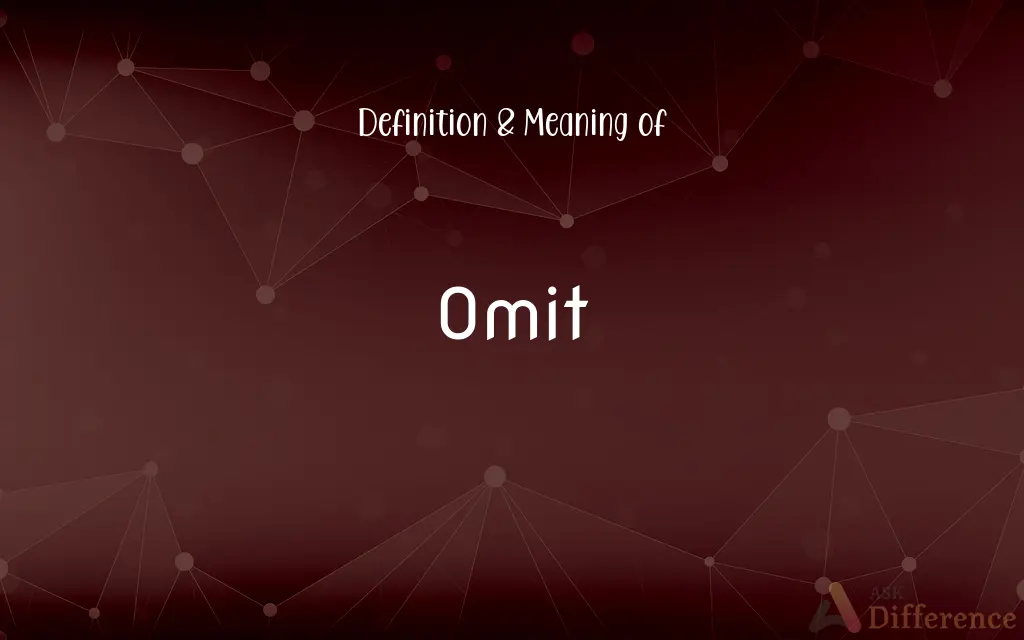
Table of Contents
Omit Definitions
To exclude or leave out something from a list or sequence.
She forgot to omit her address from the online form.
To neglect or overlook including something.
The report was incomplete because it omitted important details.
To fail to mention or include.
He decided to omit certain facts from his story.
To eliminate from consideration or choice.
The teacher decided to omit the hardest questions from the test.
To intentionally not include or consider.
The director chose to omit that scene from the movie.
To avoid or exclude purposefully.
The tour guide decided to omit the haunted house from the itinerary.
To leave something out of a piece of writing or speech.
The editor advised her to omit the lengthy description.
To refrain from including something.
Please omit nuts from the recipe due to allergies.
To miss or neglect to do something.
Don't omit to sign the document before submitting it.
To skip over or bypass in a process.
You can omit the first step if you're in a hurry.
To fail to include or mention; leave out
Omitted an important detail from the report.
To fail or neglect to do (something)
Omitted his daily walk during our visit.
To fail or neglect (to do something)
I omitted to mention that I don't eat meat.
(transitive) To leave out or exclude.
(intransitive) To fail to perform.
To delete or remove; to strike.
To neglect or take no notice of.
To let go; to leave unmentioned; not to insert or name; to drop.
These personal comparisons I omit.
To forbear or fail to perform or to make use of; to leave undone; to neglect; to pass over.
Her father omitted nothing in her education that might make her the most accomplished woman of her age.
Prevent from being included or considered or accepted;
The bad results were excluded from the report
Leave off the top piece
Leave undone or leave out;
How could I miss that typo?
The workers on the conveyor belt miss one out of ten
Omit Snonyms
Overlook
To fail to notice or consider something.
She overlooked an important detail in the contract.
Skip
To miss or leave out.
He decided to skip the meeting and work from home instead.
Bypass
To go around or avoid.
The new road bypasses the downtown area to ease traffic.
Leave out
To exclude or omit.
Make sure to leave out personal opinions from the report.
Disregard
To pay no attention to; ignore.
The planner disregarded the suggestions made by the committee.
Forget
To fail to remember.
She forgot to include her colleague in the email loop.
Exclude
To leave out or keep from being included.
The final report excludes any data from after the cutoff date.
Miss
To fail to include or mention.
The summary misses several critical points discussed in the article.
Neglect
To fail to care for or attend to something.
He neglected to mention the key argument in his essay.
Overpass
To ignore or skip over.
In his review, he overpassed the most controversial aspect of the book.
Omit Idioms & Phrases
Omit for clarity
To leave out parts of information to make something clearer.
The editor suggested to omit some technical terms for clarity.
Omit from the record
To exclude something from official documentation or reporting.
The controversial statement was omitted from the meeting's record.
Omit no effort
To make every possible effort; to not skip any steps.
She omitted no effort in her preparation for the exam.
Omit the details
To leave out specific details intentionally.
He told the story but chose to omit the details that incriminated him.
Omit in error
To accidentally leave something out.
Important data was omitted in error from the final report.
Omit at one's peril
To leave something out at one's own risk.
You can omit those instructions, but it’s at your own peril.
Omit from memory
To unintentionally forget or fail to recall something.
She seemed to have omitted that incident from her memory.
Deliberately omit
To intentionally leave something out.
He deliberately omitted the fact that he had been fired from his last job.
Omit from the list
To not include on a list or record.
His name was mistakenly omitted from the guest list.
Omit for brevity
To leave out details to keep the communication short and concise.
She omitted several less important points for brevity in her presentation.
Omit in haste
To accidentally leave something out due to rushing.
In his haste to submit the proposal, he omitted several key figures.
Omit by accident
To unintentionally leave something out.
In her haste, she omitted her name by accident on the application form.
Omit from the equation
To not consider or include something in a calculation or plan.
They decided to omit the variable from the equation as it was deemed irrelevant.
Omit from consideration
To not include something as part of a process or discussion.
The committee decided to omit the late submissions from consideration.
Intentionally omit
To purposefully leave something out.
The author intentionally omitted certain events from the biography.
Omit for convenience
To leave out something to make a process easier or more convenient.
He omitted some steps for convenience, but it affected the quality of the work.
Omit the unnecessary
To leave out things that are not essential.
Good writing often involves omitting the unnecessary.
Omit for simplicity
To exclude details to make something simpler to understand or execute.
The instructor omitted complex examples for simplicity.
Omit with purpose
To leave something out with a specific intention or goal in mind.
The filmmaker omitted certain scenes with the purpose of shortening the movie’s runtime.
Casually omit
To leave something out without much thought or deliberation.
He casually omitted the fact that he had never been abroad.
Omit Example Sentences
Don't omit any steps when assembling the furniture.
The author chose to omit the last chapter in the final draft.
He had to omit some activities due to time constraints.
Make sure to omit personal information from your public profile.
She decided to omit the old photographs from the album.
He was instructed to omit the damaged goods from the shipment.
The teacher reminded them not to omit any details in their essays.
Remember to omit dairy products if you're lactose intolerant.
In the summary, they chose to omit the less important events.
The journalist was careful not to omit any critical facts.
They had to omit some scenes to make the movie shorter.
The instructions omit how long the paint needs to dry.
The recipe suggests you can omit the salt for a healthier version.
Common Curiosities
How many syllables are in omit?
There are two syllables in "omit."
What is the first form of omit?
The first form (present form) of "omit" is "omit."
What is the verb form of omit?
"Omit" itself is the verb form.
What is the pronunciation of omit?
Omit is pronounced as /oʊˈmɪt/.
Why is it called omit?
"Omit" comes from the Latin "omittere," meaning to let go or disregard, reflecting the act of leaving out or not including something.
How is omit used in a sentence?
Example: "She decided to omit some details from the report."
What is the root word of omit?
The root word of "omit" is the Latin "omittere."
What part of speech is omit?
"Omit" is a verb.
How do we divide omit into syllables?
"Omit" is divided into syllables as "o-mit."
What is another term for omit?
Another term for "omit" is "exclude" or "leave out."
What is the third form of omit?
The third form (past participle form) of "omit" is "omitted."
What is a stressed syllable in omit?
The stressed syllable in "omit" is the second one: -mit.
What is the plural form of omit?
"Omit" does not have a plural form as it is a verb.
Is omit a collective noun?
"Omit" is not a noun, so it cannot be a collective noun.
What is the second form of omit?
The second form (past simple form) of "omit" is "omitted."
Is the omit term a metaphor?
"Omit" can be used metaphorically in some contexts.
What is the opposite of omit?
The opposite of "omit" is "include" or "insert."
Is the word omit Gerund?
The gerund form of "omit" is "omitting."
Which article is used with omit?
Articles are not used directly with the verb "omit." The use of an article would depend on the noun it accompanies.
What is the singular form of omit?
"Omit" does not have a singular form as it is a verb.
Is omit a noun or adjective?
"Omit" is a verb, not a noun or adjective.
Is omit an abstract noun?
"Omit" is a verb, so it cannot be an abstract noun.
Is omit a negative or positive word?
"Omit" is neutral; its connotation depends on the context.
Is omit a countable noun?
"Omit" is not a noun; it's a verb.
Is the word omit imperative?
"Omit" can be used in the imperative form, as in "Omit irrelevant details."
Which vowel is used before omit?
The use of a vowel before "omit" depends on the context of the sentence.
Which preposition is used with omit?
Common prepositions used with "omit" include "from" and "in."
Which conjunction is used with omit?
Conjunctions like "and," "but," or "or" can be used with "omit," depending on the sentence structure.
Is omit an adverb?
No, "omit" is not an adverb.
Is omit a vowel or consonant?
The word "omit" starts with a vowel.
Is the word “omit” a Direct object or an Indirect object?
As a verb, "omit" can have a direct object.
Which determiner is used with omit?
Determiners are not typically used directly with the verb "omit."
Share Your Discovery
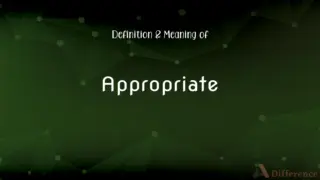
Previous Term
Appropriate Definition and Meaning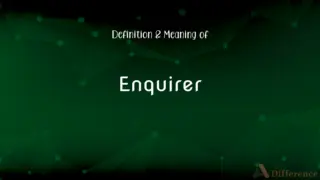
Next Term
Enquirer Definition and MeaningAuthor Spotlight
Written by
Tayyaba RehmanTayyaba Rehman is a distinguished writer, currently serving as a primary contributor to askdifference.com. As a researcher in semantics and etymology, Tayyaba's passion for the complexity of languages and their distinctions has found a perfect home on the platform. Tayyaba delves into the intricacies of language, distinguishing between commonly confused words and phrases, thereby providing clarity for readers worldwide.
Co-written by
Fiza RafiqueFiza Rafique is a skilled content writer at AskDifference.com, where she meticulously refines and enhances written pieces. Drawing from her vast editorial expertise, Fiza ensures clarity, accuracy, and precision in every article. Passionate about language, she continually seeks to elevate the quality of content for readers worldwide.














